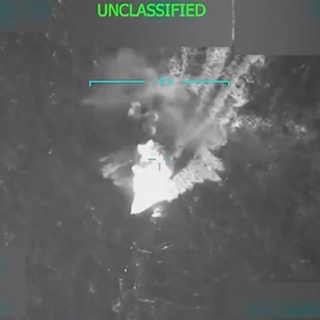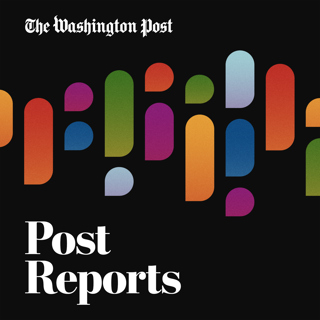
The Fed is expected to cut rates. Here's why.
Since the coronavirus pandemic, the United States economy has been in flux. While high inflation has slowly cooled off in recent years, consumers are still feeling the pressures of a weak job market and rising prices at the grocery store. Now the Federal Reserve looks to be taking matters into its own hands; Fed watchers expect the United States’ central bank to cut interest rates tomorrow. A cut could make it easier for consumers and businesses looking to borrow money and purchase goods. President Donald Trump has also been pressuring the Fed to cut rates for months.Washington Post financial writer David J. Lynch joins “Post Reports” to discuss the economic headwinds that the Federal Reserve is attempting to weather by cutting interest rates and how this is connected to Trump’s efforts to revitalize American manufacturing. You can find David’s new book, “The World’s Worst Bet: How the Globalization Gamble Went Wrong (And What Would Make It Right),” here.Today’s show was produced by Laura Benshoff with help from Lucas Trevor. It was mixed by Sam Bair. And edited by Ariel Plotnick. Thanks to Jen Liberto.Subscribe to The Washington Post here.
16 Sep 21min

Why the U.S. military is striking boats from Venezuela
President Donald Trump recently celebrated the destruction of a boat that was allegedly carrying illegal narcotics from Venezuela to the United States. The 11 people on board were killed, according to the White House. Trump released a video on social media showing the boat going up in flames, and Secretary of State Marco Rubio has said that more attacks like this could be coming. Members of Congress have yet to gain more details or evidence into the unusual strike, which did not follow typical maritime protocols. The administration has claimed those on board were “narco-terrorists” and members of the criminal group Tren de Aragua, while Venezuela’s leader Nicolas Maduro has called in thousands of reservists over concerns that this could be the opening shot in a broader conflict between the U.S. and Venezuela. These and other developments, including a rebranding of the Department of Defense and a visit by Pete Hegseth to Puerto Rico, have many wondering: Have we entered a new era in the nearly quarter-century war on terror? Today, host Colby Itkowitz speaks with national security reporter Tara Copp about the details of the attack and how Trump is making it a military priority to go after drug cartels. Today’s show was produced by Elana Gordon with help from Lucas Trevor. It was edited by Peter Bresnan and mixed by Sean Carter. Special thanks to Andy deGrandpre. Subscribe to The Washington Post here.
15 Sep 22min

Deep Reads: L.A. fires burned their block. For each, the disaster was just beginning.
The Eaton Fire tore through the Los Angeles suburb of Altadena, part of a storm that killed 19 people. It became one of the most expensive natural disasters in U.S. history, but the ultimate cost won’t be tallied in dollars and cents. That will be calculated on a different ledger: the number of residents who return to this block of West Las Flores Drive and the countless others like it.This story follows these residents. The Washington Post has spent months with three families from this Altadena street, the epicenter of the wildfire’s destructive path, following their separate journeys as they asked themselves excruciating questions and struggled to imagine their futures in a place they fear will never again feel like home.Reis Thebault, Nick Kirkpatrick, Melina Mara and Alice Li reported the piece. Thebault wrote and narrated it. Bishop Sand composed music and produced audio.Subscribe to The Washington Post here.
13 Sep 31min

The political divides after political violence
Charlie Kirk’s shooting has left both Republicans and Democrats worried about more political violence. How are prominent leaders in both parties responding to the tragedy?
12 Sep 30min

Charlie Kirk’s killing and a new age of political violence
Conservative activist Charlie Kirk was shot and killed Wednesday at Utah Valley University. As officials seek details on the identity and motive of the shooter, Americans are beginning to process Kirk’s death and what this might mean for a new era of political violence and fear in the United States. In a video posted online on Wednesday night, President Donald Trump blamed the killing, without evidence, on “radical left political violence.” On today’s episode, host Colby Itkowitz speaks with democracy reporter Yvonne WIngett Sanchez, who has covered Kirk and his organization, Turning Point USA, for years. They delve into this difficult moment and Kirk’s lasting legacy as the fiery leader of a powerful conservative youth movement. Today’s show was produced by Rennie Svirnovskiy and Elana Gordon, with help from Laura Benshoff. It was edited by Peter Bresnan and Reena Flores, with help from Renita Jablonski and Elahe Izadi. It was mixed by Sean Carter. Special thanks to Noah Bierman. Subscribe to The Washington Post here.
11 Sep 29min

Meet the people signing up for Trump’s ICE
In Arlington, Texas, thousands waited in line at a career fair in the hopes of getting hired as an ICE officer. Criminal justice reporter Robert Klemko was there and met a diverse mix of people – a former MMA fighter, a community college student and a former Marine.President Donald Trump has pushed to deport a million people during the first year of his second term. To do this big immigration crackdown, ICE is expanding its recruiting efforts and incentivizing people to join through large signing bonuses and a pitch to “defend the homeland.”Host Elahe Izadi speaks with Robert about what he heard from those who signed up and what the potential risks of ramping up hiring and training efforts.Today’s show was produced by Sabby Robinson. It was edited by Reena Flores and mixed by Sam Bair. Subscribe to The Washington Post here.
10 Sep 27min

Confused about fall vaccines? We have answers.
Since taking over as health and human services secretary earlier this year, Robert F. Kennedy Jr. has fired members of a key vaccine panel, signaled shifts to the childhood immunization schedule and changed guidelines about who should receive the coronavirus vaccine. Now there are questions about which pharmacies will offer shots and whether insurance companies will cover the cost.“Post Reports” host Elahe Izadi is joined by Lena Sun, a national health reporter for The Washington Post, to wade through the confusion and answer listener questions about vaccines this fall. They discuss how to find a covid shot, when might be the best time to receive your flu vaccine, and how Kennedy and the Trump administration could continue to reshape vaccine guidance and public health in the United States. Today’s episode was produced by Rennie Svirnovskiy with help from Lucas Trevor. It was mixed by Sam Bair and edited by Elana Gordon with help from Reena Flores. Thanks to Fenit Nirappil.Subscribe to The Washington Post here.
9 Sep 31min

Trump promised to end DEI. Then, rural teachers lost money.
Montgomery County is a small, rural area in the middle of North Carolina. The county has struggled financially for years, and its school district depends on government grants to survive. This year, the Trump administration cut $600 million in grants to teacher-training programs across the country, and Montgomery County’s $21 million grant was included. The Trump administration says the grants were cut because they were used to train teachers and agencies on diversity, equity and inclusion practices.Host Elahe Izadi speaks with national reporter Ben Brasch about his reporting on Montgomery County’s schools. He shares why some parents and teachers are frustrated by the Trump administration’s seemingly indiscriminate cuts, and why the elimination of the county’s grant affects the school district’s ability to retain and train quality teachers.Today’s show was produced by Thomas Lu. It was edited by Ariel Plotnick with help from Reena Flores and mixed by Sean Carter. Subscribe to The Washington Post here.
8 Sep 22min






















